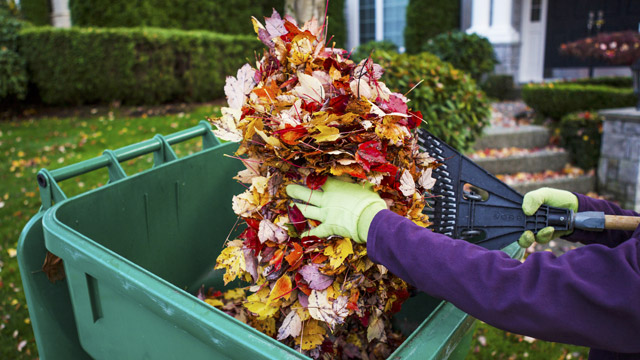 Tom Baker/PhotoSpin
Tom Baker/PhotoSpin
For many of us, fall means it’s time to dig into yard work to clear out fallen leaves and get everything ready for fresh landscaping in the spring. But if you have seasonal allergies, working in your yard may mean an increase in symptoms like a runny or stuffy nose.
Allergies occur when your body’s immune system overreacts to something in your environment. The immune system acts as a defense system to keep harmful bacteria and virus particles from making you sick.
When the immune system reacts to something that is not harmful, like pollen, the result is an allergic reaction.
Common symptoms of nasal or skin allergies include:
• Itchy, watery eyes
• Runny nose
• Sneezing
• Hives or rashes
Try these suggestions from the American College of Allergy, Asthma and Immunology (ACAAI) to reduce your allergy symptoms this fall.
Choose the right time
If you like to work outside in the morning, you’re probably in good shape. Pollen counts tend to be lower in the morning and at their peak around mid-day and into the afternoon. So try to get out in the yard to clean up in the morning or evening to reduce allergy symptoms.
Watch the weather
Rain showers can temporarily help clear the air and reduce pollens. But thunderstorms or windy days can lift more pollen into the air. And standing water after a storm can lead to increased mold that may trigger allergy symptoms.
Put on protection
It may not be your favorite look, but wearing protective clothing such as gardening gloves and a mask can help keep your symptoms to a minimum. Pollen or dust masks available at your local hardware store can help keep your lungs free of pollen while sunglasses can help keep pollen from making your eyes itchy.
Wear a hat to keep airborne pollen from collecting on your hair and being carried into the house. Long sleeves, long pants and gloves can protect your skin from irritants including insect stings.
Pick your plants
You can’t control what your neighbors put in their yards. But you can control what plants you will have to deal with directly by choosing plants for your yard that don’t trigger your allergies.
If you plan to plant something new in your yard, check the website pollen.comto learn more about plants that may be better choices to help control your allergy symptoms. The website also shows current pollen counts that can help you decide if it’s a good day to spend time outdoors.
Keep it clean
Fallen leaves can collect dust and pollens, and mold can grow under leaves as they decompose on the ground. So do yourself a favor and keep your yard as clear as possible in the fall. Be sure to continue to mow your grass as well. Grass that grows long can flower, which also produces pollen.
Leave pollen outdoors
Once you finish working in the yard, take care not to pollute your home with pollen and other allergens. Take off your shoes before you go inside and take a shower right away to get pollen off your skin and hair. And be sure to wash your work clothes before you wear them again.
Taking an over-the-counter antihistamine may help reduce your allergy symptoms. Talk to your health care provider to find out which allergy medication is safe and appropriate for you.
Sources:
Allergist. How to Reduce Allergens in Your Yard this Fall. Web. September 24, 2013.
http://www.acaai.org/allergist/news/Pages/HowtoReduceAllergensinYourYard...
Medline Plus. Allergy. Web. September 24, 2013.
http://www.nlm.nih.gov/medlineplus/allergy.html
WebMD. Allergy Basics. Web. September 24, 2013.
http://www.webmd.com/allergies/guide/allergy-basics
Reviewed September 25, 2013
by Michele Blacksberg RN
Edited by Jody Smith





Add a CommentComments
There are no comments yet. Be the first one and get the conversation started!